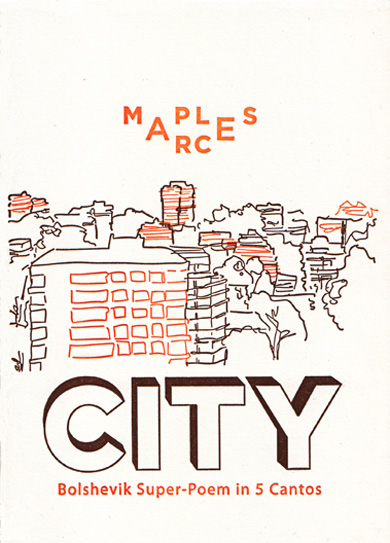
City: Bolshevik Super-Poem in 5 Cantos
Manuel Maples Arce
Translated by KM Cascia
February 2010
The unhinged masses
splash musically in the streets.
And now the thieving bourgeoisie will tremble
for their riches,
robbed from the people,
but someone hid the sheet music to
an explosion beneath their dreams.
Here’s my poem:
Pennants of cheering in the wind,
hair on fire
and captive mornings in her eyes.
Oh musical
city
made entirely of mechanical rhythms.
Tomorrow, perhaps,
only the living fire of my verses
will light these humbled horizons.
Written between 1922 and 1924, the year it was published, City: Bolshevik Superpoem in 5 Cantos is a long-form poem that became the most po- litically and aesthetically aggressive of the career of Mexican avant-garde poet Manuel Maples Arce. The subject is the “City” in state of revolutionary turmoil; however, the specifics of what city remains opaque. References to Mexico City and Xalapa are both discernible in the text, but perhaps only as the inspiration for a future Stridentist city, elsewhere referred to as Striden- topolis. The poem evokes the City tracing a narrative of revolution from its early exuberance, through periods of violence, and finally to a sort of hollow, confused disappointment in the final canto. This narrative was directly drawn from Maples Arce’s own experiences with the Mexican Revolution and its very messy aftermath.
About the Author
Manuel Maples Arce (1900-1981) was born in Papantla, Veracruz. The son of a judge, he spent time in Tuxpan before the family moved to Xalapa, where he attended prep school. He studied law in the city of Veracruz and Mexico City. In 1921, he published the first Stridentist manifesto, which drew a number of like-minded avant-gardists into his orbit and helped make connections with other radical artists in both Latin America and Europe. He returned to Xalapa in 1925 and was first a judge and then General Secretary of local government under General Herberto Jara, Governor of Veracruz at the time. Maples used his position to turn Xalapa into a center of revolutionary art, attracting left-wing artists from throughout Mexico and the world. When General Jara was removed from office, the artistic community in Xalapa fell apart and Maples entered the foreign service, serving in numerous diplomatic posts around the world. Though he abandoned both the politics and the avant-garde modes of his youth in later years, his major works of the period, Andamios interiores (1922), Urbe: superpoema bolchevique en cinco cantos (1924), and Poemas interdictos (1927) remain key texts of the global 20th century avant-garde.
About the Translator
KM Cascia, fka Brandon Holmquest (b. 1979), was born in Michigan City, Indiana. Leaving school at 17, they lived in Chicago, Philadelphia, and New York at various times. Formerly an editor of the translation journals Calque and Asymptote, they are also the author of two collections of poems, Goethe and Days, as well as numerous translations published in small outlets on- and offline, such as Apiary, Circumference, and Anomolous. They are currently an editor at Marxist Analysis.
In the News
Links
Publication Details
Hand-bound. 32 pp, 5.25 x 7.5 in
Publication Date: February 28 2010
Series: Lost Literature #8